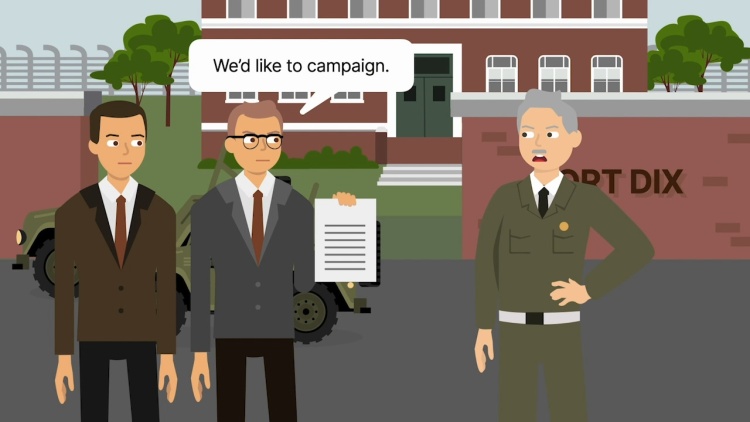Greer v. Spock
United States Supreme Court
424 U.S. 828 (1976)
- Written by Megan Petersen, JD
Facts
The Fort Dix Military Reservation is a United States Army post under the exclusive control of the federal government. Under Fort Dix Reg. 210-26, speeches and demonstrations of a partisan political nature are banned on Fort Dix. Spock and Hobson (plaintiffs) were candidates of the People’s Party for the offices of President and Vice President of the United States, and Jenness and Pulley (plaintiffs) were candidates of the Socialist Workers Party for the same offices. In 1972, Spock, Hobson, Jenness, and Pulley (candidates) wrote a joint letter to Major General Bert David, commanding officer of Fort Dix, informing him of their intention to enter the reservation for the purpose of distributing campaign literature and holding a meeting to discuss election issues with service personnel and their dependents. Relying on Reg. 210-26, General David rejected this request. The candidates brought suit in federal district court against Greer and other Fort Dix personnel (defendants) on the ground that this denial of entry violated their First Amendment rights. The district court entered a permanent injunction prohibiting interference with the candidates’ exercise of speech, and the court of appeals affirmed. The United States Supreme Court granted certiorari.
Rule of Law
Issue
Holding and Reasoning (Stewart, J.)
Dissent (Brennan, J.)
What to do next…
Here's why 907,000 law students have relied on our case briefs:
- Written by law professors and practitioners, not other law students. 47,100 briefs, keyed to 996 casebooks. Top-notch customer support.
- The right amount of information, includes the facts, issues, rule of law, holding and reasoning, and any concurrences and dissents.
- Access in your classes, works on your mobile and tablet. Massive library of related video lessons and high quality multiple-choice questions.
- Easy to use, uniform format for every case brief. Written in plain English, not in legalese. Our briefs summarize and simplify; they don’t just repeat the court’s language.





